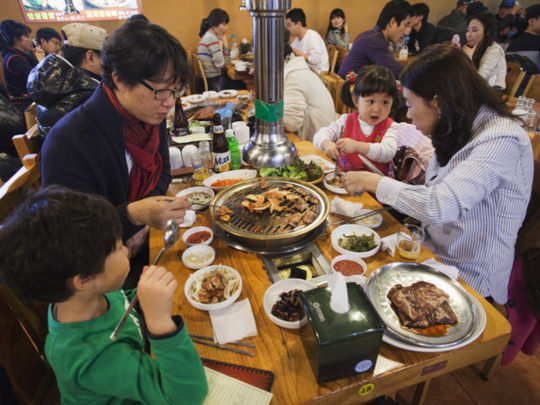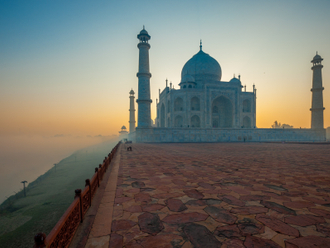
The cast of Kimchi Chronicles mirrors the eclectic, bold and powerful cuisine the series aims to trace. World-renowned chef Jean-Georges Vongerichten and his Korea-born wife, Marja, are the main hosts of the show, while Hollywood elite Heather Graham and Hugh Jackman with his wife, Deborra-Lee Furness, lend the glam factor.
The popular and first-of-its-kind travel and cooking show takes viewers on a gastronomic journey through mist-covered hills and noisy markets in picturesque South Korea.
A global trend
But the series, which premiered on American television in 2011, only confirmed what food bloggers, talk-show hosts, chefs and industry experts had been whispering for a while — that Korean food is here to stay. Food consultants Baum + Whiteman predicted that the loud, punchy flavours of Korean cuisine would emerge as an influential global food trend, going as far as calling kimchi the food ingredient of 2012.
This prediction has rung true — from quirky food trucks and family-style restaurants to fine dining establishments, all indicators point to Korean cuisine becoming as ubiquitous as its other Asian counterparts.
“Everyone is into Korean culture, whether it’s Gangnam Style or loud and dramatic telly dramas and soaps. The world is turning its attention to our country,” says Jia Choi, President of O’ngo Food Communications. O’ngo is a food tour company in Seoul dedicated to spreading awareness about Korean food through food tours, cooking classes and social media.
Going mainstream
From food trucks in Los Angeles to start-ups in Dubai’s Jumeirah Lakes Towers (JLT), there is no denying the popularity of Korean food. Street fusion has facilitated mainstream acceptance of this culinary heritage by offering a quick, affordable and hip alternative. Hot dog stands in the US are serving kimchi instead of sauerkraut and western kale is being used for California bibimbaps. California Pizza Kitchen has a Korean barbecue beef pizza. In a nod to Korean food culture, T.G.I. Friday’s added Korean steak tacos to its menu last year. Michelin-star restaurant Annisa in New York serves Korean yukhoe or steak tartare juiced with pear, as well as grilled mackerel with gochujang, the typical Korean red pepper paste.
Full-bodied flavours
Korean food is not shy or subtle. It is all about strong, robust and full-bodied flavours, fermenting and pickling — which requires patience — and barbecue-grilled marinated meats that have to be done just right. It’s about understanding the complexities that various banchans or side dishes add to the meal, and about realising that the cuisine is as rooted in tradition as it is devoted to innovation.
Korean food has unique characteristics that are very appealing. It is a flavourful cuisine full of garlic, spices, various vegetables and unique bean and pepper pastes. “The food is often shared and cooked at the table, and I think this style of eating is more appealing to guests looking for a dining experience. It’s a very kinetic and energetic type of cuisine. Plus it is very healthy,” says Choi.
Young Rak Jung, Operations Director at Dubai-based restaurant Shogun, says, “Korean food is deeply intertwined with the culture and people of its origin. Koreans are a peaceful and fun-loving nation, with a predominantly Buddhist background that has made way for healthy and largely vegetable-based food, which we call hansik. Korean food is all about warm hospitality and family-style table gatherings.”
Shogun first opened its doors in 1980 at the Riviera Hotel by the creek. “We initially opened the restaurant as there was no place for our family or other Korean expats to enjoy Korean food. It was the first Korean restaurant in the country,” says Jung. Today, it is the mainstay of the Korean culinary landscape in the Emirates.
Opportune moment
A number of factors had to come together for the Korean food fad to catch on. First came the edgy and hip K-pop of Psy, and, sensing an opportunity, restaurateurs and retailers jumped on to the Gangnam bandwagon by opening up cool K-pop inspired eateries that like their pop icon inspiration went viral.
Of course, it helps that the Korean government is taking such a deep interest in promoting its food. Government-funded projects such as Hansik Globalization are set up to push the development of Korean restaurants and suppliers in international markets, and to see that Korean food is being branded as a harmony of delicately balanced flavours packed with nutrition. There was no way that Dubai would remain untouched.
Hyung Jun Lee, the Owner and Managing Director of recently opened Kpop Chicken, says, “When I came to Dubai in 2007, there were only three Korean restaurants in the city. Now there are almost a dozen.” He has witnessed an increase in the number of Korean expats and rising interest in the food and culture of his home country.
Lee says it has a lot to do with lifestyle awareness. “People are concerned about eating healthy and right, but that doesn’t mean it has to be boring. Korean food is a balance of healthy food that is also bursting with flavour,” he adds.
Kpop Chicken in JLT serves both authentic and fusion fare, and Lee’s clientele is split evenly between Korean expats and other nationalities.
Ryan Sunghaak Chung, Managing Director of C Cube Hospitality Solutions, which owns the KimChikin chain of restaurants across the city, agrees with Lee. “Koreans, such as my mum, associate each food and ingredient with health benefits. For instance, when Koreans offer food to others we say — ‘try this, it has a lot of calcium’. We believe food is the best medicine and that every mum is the best doctor,” says Chung.
KimChikin is a contemporary restaurant, and Korean expats represent 10 per cent of its clientele. Other Asians including Indians and Arabs, and Europeans make up the rest. A testament to Dubai’s love for all things K.






